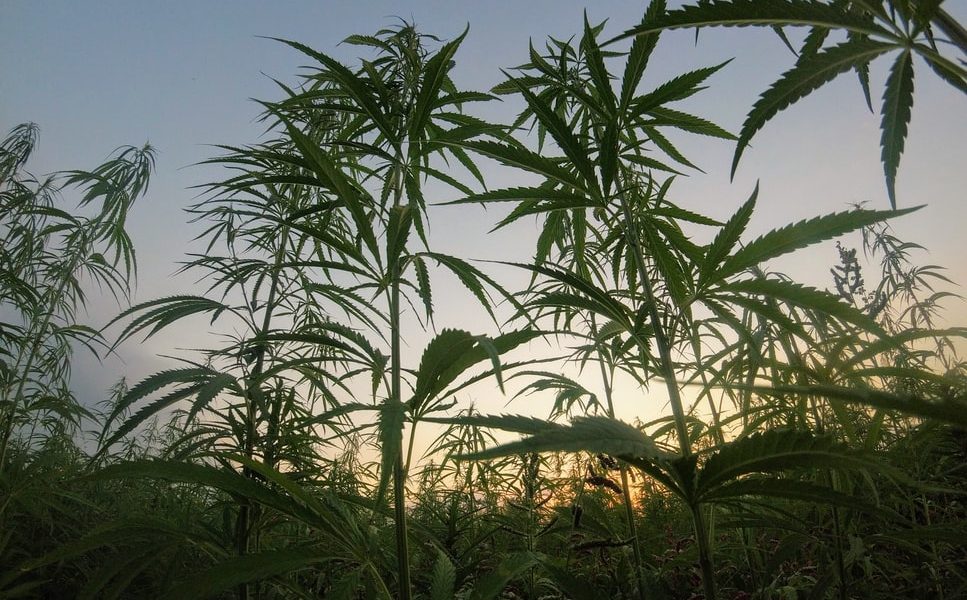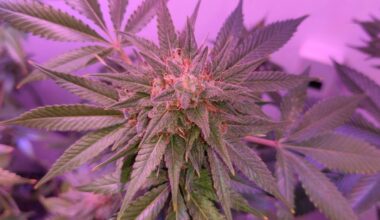Governors across the U.S. have been taking the opportunity to tout marijuana reform accomplishments as part of their annual State of the State speeches and budget requests this month.
From New York to South Dakota, the comments and proposals from state executives demonstrate how cannabis has become more mainstream and is being talked about in high profile venues alongside more traditional fare such as taxes, education and infrastructure.
It’s also part of a growing theme, as governors have increasingly brought up marijuana policy in State of the State addresses each year to kick off the new year as the legalization movement spreads.
Here’s a look at what governors are saying about marijuana policy in 2022:
New Jersey
While adult-use marijuana retail sales have yet to launch in New Jersey after voters approved a 2020 legalization referendum, the state’s top executive said in his State of the State address that he’s expecting an economic boon.
“Many jobs await in the cannabis industry ready to take off,” Gov. Phil Murphy (R) said.
The governor also said separately in his second inaugural address this month that “businesses in the new cannabis industry that we are setting up in the name of social justice” are part of efforts to “continue growing the innovation economy that will power our future and make us a model for the nation and the world.”
Businesses on the cutting edge of new technologies that will revolutionize our grasp of the possible.
Businesses in the new cannabis industry that we are setting up in the name of social justice.
In online gaming and sports betting, which we now dominate.
— Governor Phil Murphy (@GovMurphy) January 18, 2022
As the state prepares to implement legal cannabis sales, Murphy said late last year that he’s open to giving adults the right to cultivate marijuana for personal use even though it’s not currently written into the law.
New Mexico
New Mexico Gov. Michelle Lujan Grisham (D) talked in here State of the State speech about the economic potential of the marijuana industry under the legalization law she signed last year.
“We’re expanding our economic footprint into every single community,” the governor said in her State of the State address. “Legal cannabis is going to create thousands of jobs and serious tax revenue for local governments to support local services in every corner of our state.”
Legal cannabis is going to create thousands of jobs & serious tax revenue to support local services.
Clean hydrogen will support thousands of jobs, especially in rural New Mexico, while helping us sprint toward our net-zero carbon deadlines and decarbonize transportation.
— Michelle Lujan Grisham (@GovMLG) January 18, 2022
New York
New York Gov. Kathy Hochul (D) released a State of the State book earlier this month that called for the creation of a $200 million public-private fund to specifically help promote social equity in the state’s burgeoning marijuana market.
The governor said that while cannabis business licenses have yet to be approved since legalization was signed into law last year, the market stands to generate billions of dollars, and it’s important to “create opportunities for all New Yorkers, particularly those from historically marginalized communities.”
That proposal was also cited in Hochul’s executive budget, which was released last week. The budget also estimated that New York stands to generate more than $1.25 billion in marijuana tax revenue over the next six years.
The briefing book for the executive budget touts how Gov. Kathy Hochul (D) has “prioritized getting New York’s cannabis industry up and running” since marijuana was legalized under her predecessor last year. That includes appointing key regulators who’ve been “creating and implementing a comprehensive regulatory framework.”
Rhode Island
The governor of Rhode Island included a proposal to legalize marijuana as part of his annual budget plan—the second time he’s done so. And time around, he also added new language to provide for automatic cannabis expungements in the state.
Gov. Dan McKee (D) released his request for the 2023 fiscal year on Thursday, calling for adult-use legalization as lawmakers say they’re separately nearing a deal on enacting the reform. It appears that an outstanding disagreement between the governor and legislators concerning what body should regulate the program remains unresolved based on the new budget proposal, however.
In general, McKee’s plan would allow adults 21 and older to purchase and possess up to one ounce of cannabis, though it would not provide a home grow option. Adults could also store up to five ounces of marijuana in secured storage in their primary residence.
“The governor recommends creating a strictly regulated legal market for adult-use cannabis in the state,” an executive summary states. “This proposal would create a weight-based excise tax on marijuana cultivation, an additional retail excise tax of 10 percent, and also apply sales tax to cannabis transactions.”
South Dakota
South Dakota Gov. Kristi Noem (R) isn’t a fan of adult-use legalization, going so far as to fund a lawsuit against a voter-approved 2020 reform initiative that ultimately led to a court ruling voiding the law. Her office has even suggested that activists behind the successful legalization campaign should front the legal bills for the case.
However, she seems to recognize the popularity of the issue and has recently attempted to associate herself with the implementation of the separate medical cannabis legalization law that voters also approved, as she did in her State of the State address this month.
“I take our citizens’ health seriously. I don’t make these decisions lightly. And when we create new policy, we’re going to do everything we can to get it right from day one,” Noem said. “Our state’s medical cannabis program is one example.”
“It was launched on schedule according to the timeline passed by South Dakota voters,” she said. “I know there will be some debate about that program this session. My focus is on making sure South Dakota has the safest, most responsible, and well-run medical cannabis program in the country.”
Noem tried to get the legislature to approve a bill to delay implementation of the medical cannabis program for an additional year, but while it cleared the House, negotiators were unable to reach an agreement with the Senate in conference, delivering a defeat to the governor.
In response, her office started exploring a compromise last year, with one proposal that came out of her administration to decriminalize possession of up to one ounce of cannabis, limit the number of plants that patients could cultivate to three and prohibit people under 21 from qualifying for medical marijuana.
Advocates weren’t enthused with the proposal, and now they’re taking a two-track approach to enacting broader legalization legislatively and through the ballot.
Virginia
In his final State of the Commonwealth address this month, now former-Gov. Ralph Northam (D) talked about the criminal justice implications of his state’s move to legalize marijuana last year.
“We also worked closely with you to make sure our criminal justice system reflects the Virginia that we are today. Too often, our modern-day punishments and practices have their roots in a more discriminatory and unfair past,” he said. “That’s why we’ve made marijuana use legal.”
Too often, our modern-day punishments and practices have their roots in a more discriminatory and unfair past.
That’s why we’ve made marijuana use legal. That’s also why we have ended use of the death penalty in Virginia—the first southern state to do so. #VASOTC
— Governor Ralph Northam (@VAGovernor73) January 13, 2022
He also thanked the legislators who championed the reform “for their work on this policy, which is complicated, but important.”
Meanwhile, the new governor of Virginia, Glenn Youngkin, said recently that while he’s not interested in re-criminalizing marijuana possession, which became legal in the state last summer, but he feels there’s “still work to be done” before he gets behind creating a market for commercial sales and production.
Bipartisan Pennsylvania Senators File Bill To Let Medical Marijuana Patients Grow Their Own Plants
Photo courtesy of Mike Latimer.
Medical Disclaimer:
The information provided in these blog posts is intended for general informational and educational purposes only. It is not a substitute for professional medical advice, diagnosis, or treatment. Always seek the advice of your physician or other qualified healthcare provider with any questions you may have regarding a medical condition. The use of any information provided in these blog posts is solely at your own risk. The authors and the website do not recommend or endorse any specific products, treatments, or procedures mentioned. Reliance on any information in these blog posts is solely at your own discretion.







